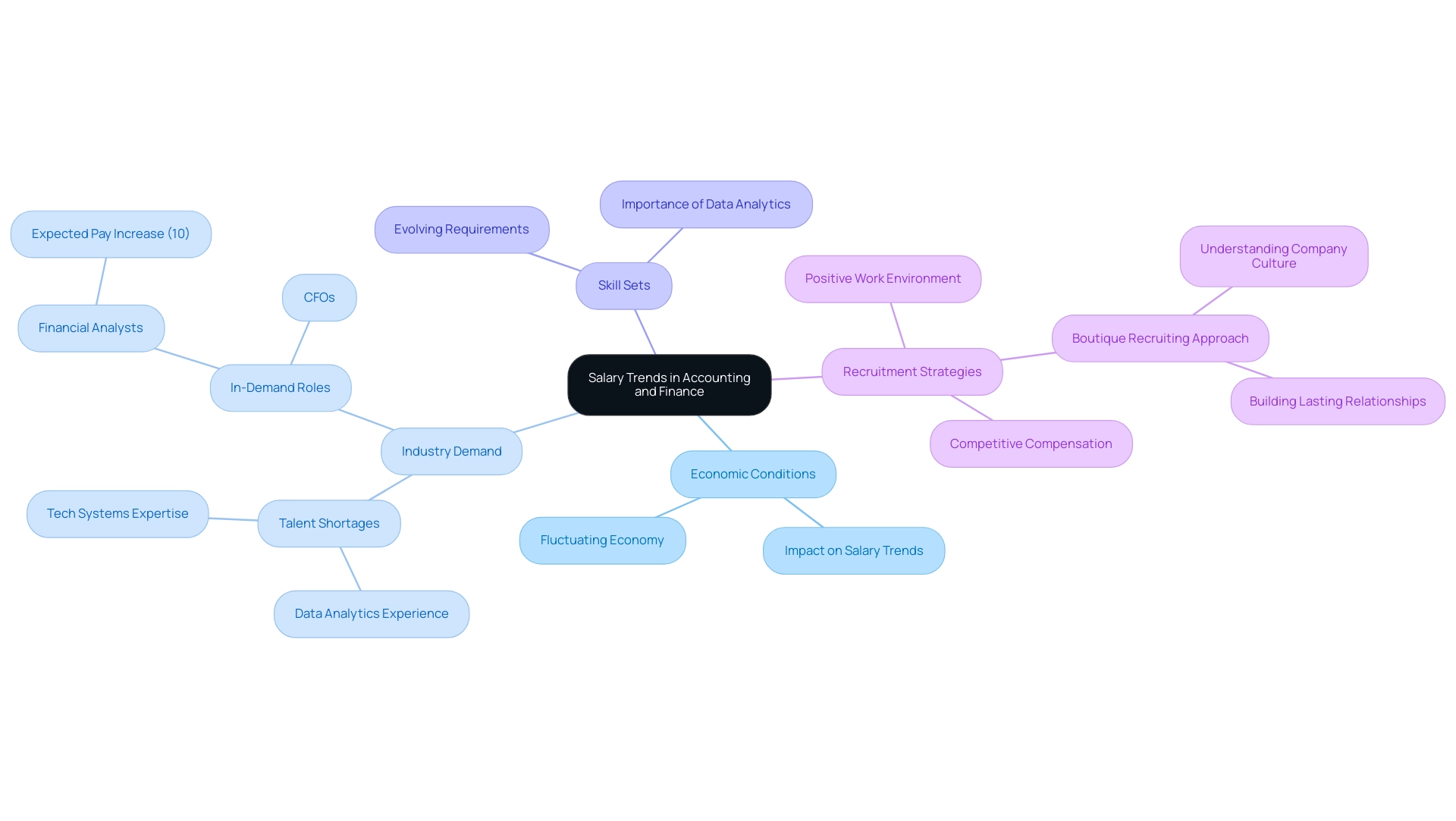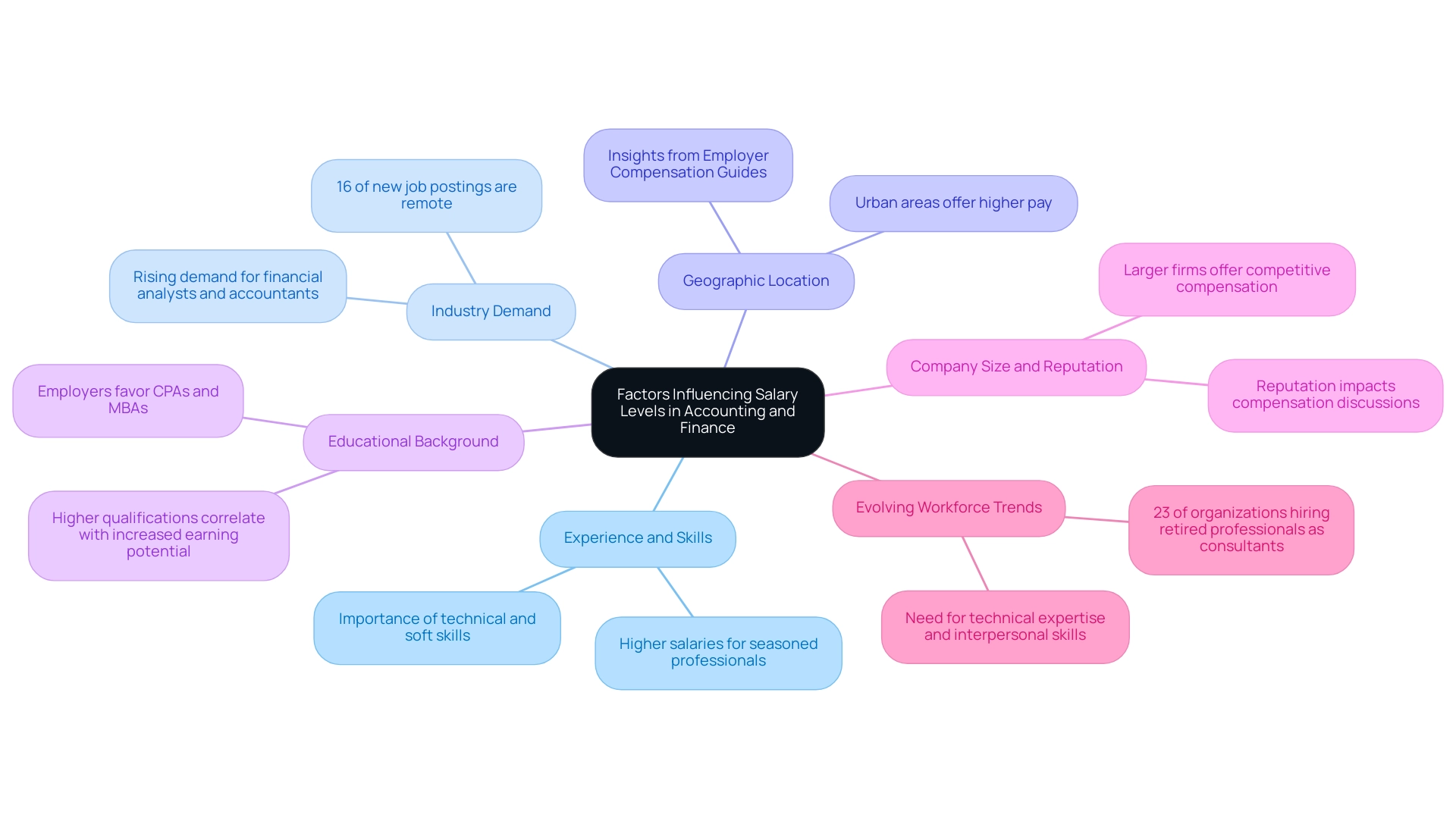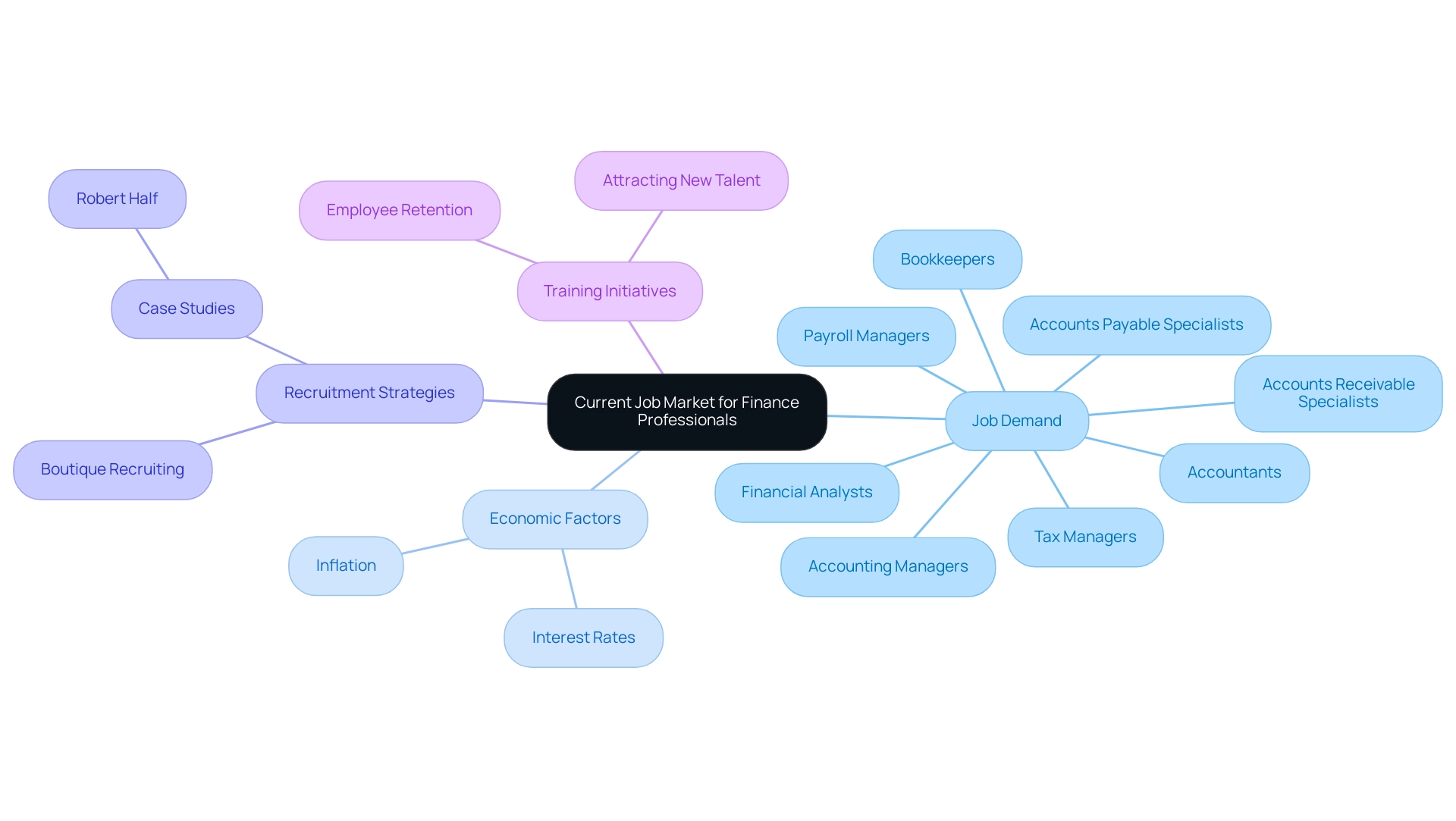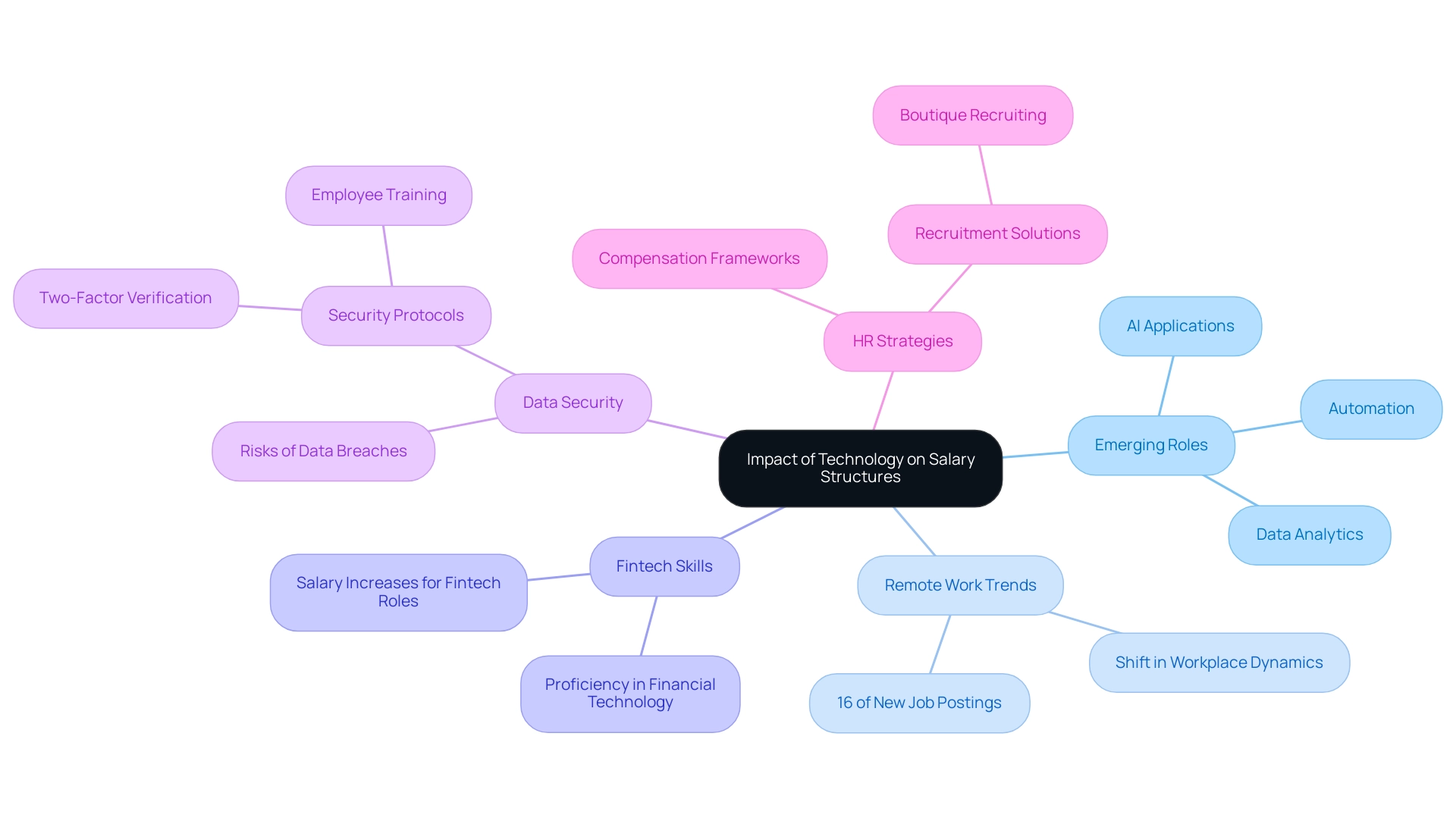Overview
The article examines the salary trends in the accounting and finance sectors for 2025, underscoring the critical factors that influence compensation levels. Salaries are anticipated to rise, driven by economic conditions, talent shortages, and the escalating demand for specialized skills, particularly in data analytics and technology. This evolving landscape necessitates that HR managers implement competitive compensation strategies to attract and retain top talent. As the industry adapts, understanding these dynamics becomes essential for effective recruitment and retention.
Key Highlights:
- Salary trends in accounting and finance are influenced by economic conditions, industry demand, and evolving skill sets.
- In 2025, starting wages for roles like financial analysts and CFOs are expected to rise significantly, with financial analysts seeing increases of up to 10%.
- Talent shortages in finance, especially for data analytics skills, are intensifying competition for skilled professionals.
- Educational qualifications, such as CPA or CFA, correlate with higher salary expectations, with CPAs projected to earn around $85,000 in 2025.
- Regional salary variations are significant; urban areas offer higher compensation due to cost of living and demand.
- Salary benchmarking is crucial for HR managers to ensure competitive compensation packages aligned with market trends.
- Technology is reshaping salary structures, with increased demand for roles that require proficiency in fintech and data security.
- Organizations are encouraged to invest in training and development to enhance employee retention and attract new talent.
Introduction
In the dynamic landscape of accounting and finance, understanding salary trends is crucial for organizations striving to attract and retain top talent. As the job market evolves in 2025, a confluence of economic factors, industry demand, and technological advancements is reshaping compensation structures.
With starting salaries projected to rise significantly for high-demand roles, HR managers must navigate these changes to develop competitive compensation strategies. This article delves into:
- The key influences on salary levels
- The critical role of education and qualifications
- The emerging trends that are redefining the hiring landscape
Providing valuable insights for organizations looking to thrive in a competitive environment.
Understanding Salary Trends in Accounting and Finance
The factors influencing accounts & finance salary trends include economic conditions, industry demand, and the evolving skill sets required for various roles. In 2025, initial wages are expected to increase notably, especially for in-demand roles like financial analysts and CFOs. This upward trend in accounts & finance salary is vital for HR managers seeking to attract and retain top talent in a competitive environment.
The Robert Half 2025 Compensation Guide suggests that starting wages for positions related to accounts & finance salary in accounting operations and financial analysis are anticipated to rise significantly. For example, financial analysts can anticipate pay increases of up to 10% compared to previous years, driven by the growing need for expertise in data analytics and technology systems. This emphasizes the necessity for HR professionals to stay updated on pay standards to create competitive compensation strategies.
Furthermore, financial institutions are encountering significant talent shortages, especially for individuals with experience in data analytics and tech systems. As businesses navigate a fluctuating economy, the demand for skilled professionals in accounting and finance, particularly regarding accounts & finance salary, continues to rise, further intensifying competition for talent. Case studies show that firms that proactively adjust their salary offerings in response to market trends not only attract qualified individuals but also enhance employee satisfaction and retention.
Boutique Recruiting’s impressive track record of success, characterized by numerous satisfied clients and job seekers, underscores the importance of effective recruitment strategies in this context. Their tailored service and careful comprehension of company culture enable them to provide individuals who not only meet technical qualifications but also align well within the organizational environment. By moving beyond conventional job boards, Boutique Recruiting nurtures authentic connections that improve the applicant experience, ensuring that top talent is not only drawn but also involved throughout the hiring process.
Expert insights stress that to stay competitive in the 2025 job market for accounts & finance salary, organizations must not only provide appealing compensation but also cultivate a positive work atmosphere. As Eric Eddy observed, Boutique Recruiting has a demonstrated capacity to provide exceptional professionals swiftly and effectively, which is crucial for developing a strong workforce capable of navigating the intricacies of the financial environment.
In conclusion, comprehending the 2025 trends in accounts & finance salary is essential for HR managers. By leveraging insights from the Robert Half Salary Guide and staying attuned to economic shifts, firms can implement effective compensation strategies that align with industry standards and meet the expectations of today’s candidates. Additionally, addressing common hiring pitfalls through a streamlined interview process will further enhance the ability to attract and retain the best talent in this competitive field.
Let’s discuss your hiring needs and how Boutique Recruiting can help streamline the process to attract top-notch talent!

Key Factors Influencing Salary Levels in the Industry
Several key factors significantly influence compensation levels in the accounting and finance sectors in 2025:
- Professionals with extensive experience and specialized skills typically receive a higher accounts & finance salary due to their proven track record. As the industry evolves, the value placed on both technical expertise and soft skills has become increasingly important. Organizations recognize that seasoned professionals can navigate complex challenges effectively.
- Industry Demand: The demand for specific roles, particularly financial analysts and accountants, continues to rise, reflected in the increasing accounts & finance salary expectations. Notably, 16% of new job postings in finance and accounting are for fully remote positions, indicating a shift in workplace dynamics that further influences compensation trends.
- Geographic Location: Compensation variations are pronounced based on geographic location, with urban areas typically offering higher pay compared to rural regions. Boutique Recruiting’s comprehensive Employer Compensation Guide and Candidate Compensation Guide provide valuable insights for HR managers in San Diego, Orange County, and Beverly Hills, helping them set competitive pay benchmarks that reflect local market conditions.
- Educational Background: Higher educational qualifications, such as a CPA or MBA, often correlate with increased earning potential. Employers are eager to provide attractive compensation to individuals who hold advanced degrees, as these qualifications suggest a deeper comprehension of the field and a dedication to professional growth.
- Company Size and Reputation: Larger firms or those with strong reputations in the industry tend to offer more competitive compensation to attract top talent. The reputation linked to well-established firms can greatly impact compensation discussions, as applicants often pursue the stability and advancement opportunities that accompany such organizations.
- Evolving Workforce Trends: To address staffing gaps, 23% of organizations are hiring retired finance and accounting professionals as consultants, emphasizing the importance of both technical expertise and interpersonal skills in applicants. This trend aligns with the evolving needs of the industry and highlights the necessity for HR managers to adapt their recruitment strategies accordingly.
Understanding these factors is crucial for HR managers in the finance sector, as they navigate the complexities of recruitment and accounts & finance salary negotiations to attract and retain high-quality talent. As Eric Eddy from CPA Resources Global Professionals observes, Boutique Recruiting’s ability to deliver top-notch talent quickly and efficiently reinforces the firm’s reputation as a trusted partner in recruitment. Furthermore, Boutique Recruiting differentiates itself by focusing on building lasting relationships and providing personalized service throughout the recruitment process, ensuring that candidates not only meet technical qualifications but also fit well within the organizational environment. The guides specifically address the roles of CAO, Controller, Sr. Accountant, and others, providing tailored insights that enhance the recruitment process.

The Role of Education and Qualifications in Salary Expectations
Education and qualifications are pivotal in shaping salary expectations for accounts and finance professionals within the finance and business sectors. Candidates possessing advanced degrees or professional certifications, such as CPA (Certified Public Accountant) or CFA (Chartered Financial Analyst), typically command higher compensation than their peers with only a bachelor’s degree. In 2025, the average compensation for a CPA is projected to reach approximately $85,000, significantly surpassing the average earnings of non-certified accountants, which hovers around $55,000.
Moreover, specialized training in areas such as tax law, financial analysis, or forensic accounting can further enhance earning potential. For instance, accountants with expertise in tax law may see their compensation rise by as much as 20% compared to those lacking such specialization. HR managers must consider these educational factors when crafting competitive compensation packages aimed at attracting top-tier talent.
In addition to education, applicants should evaluate essential factors when assessing job offers, such as aligning opportunities with their career goals and values. The first job offer may not always be the most advantageous; exploring multiple options can uncover roles that better align with long-term aspirations. Candidates should avoid the trap of accepting the first job offer that arises, as this may lead to regret if it does not support their professional growth.
Boutique Recruiting emphasizes this approach, guiding individuals to make informed decisions that reflect their professional growth and personal satisfaction.
Expert opinions underscore the significance of education in salary negotiations. Many industry leaders assert that individuals with advanced qualifications not only bring enhanced technical skills but also demonstrate a commitment to their professional development, rendering them more valuable to employers. Eric Eddy, an employer at CPA Resources Global Professionals, highlights this by stating the firm’s ability to deliver top-notch individuals quickly and efficiently, underscoring the importance of qualifications in recruitment.
Additionally, Boutique Recruiting’s meticulous approach to understanding company culture and specific job requirements, as illustrated in their differentiation strategy, enables them to present candidates who not only meet technical qualifications but also fit well within the organizational environment. This connection between education and recruitment methods is vital for HR managers aiming to attract and retain exceptional candidates.
As the finance field continues to evolve, the influence of education and credentials on accounts and finance salary expectations remains a critical consideration for HR managers seeking to attract and retain high-quality candidates. The firm’s impressive track record of success and numerous satisfied clients further emphasizes the importance of education in recruitment and salary negotiations.
Are you ready to elevate your recruitment strategy? Reach out today for a consultation and discover how we can help you attract the best talent in the financial sector.
Navigating the Current Job Market: Demand and Economic Impact
In 2025, the job market for finance professionals is witnessing robust demand, expected to significantly influence accounts & finance salary. This trend is driven by economic growth and the increasing complexity of financial regulations. The demand for skilled talent, particularly in roles such as financial analysts, accountants, and finance managers, underscores the challenges many organizations face in filling essential positions within accounts & finance salary. Notably, the demand for accounting professionals is projected to grow by 6% this year, reflecting the sector’s resilience and the ongoing need for expertise in financial management.
Boutique Recruiting specializes in targeted recruitment services for these high-demand roles, ensuring that firms connect with the right talent efficiently.
Economic factors, including inflation and fluctuating interest rates, significantly influence trends in accounts & finance salary within the industry. As companies grapple with rising operational costs, they are compelled to reassess their accounts & finance salary structures to attract and retain top talent. This dynamic underscores the importance for HR managers to remain vigilant regarding economic indicators that can affect hiring strategies and the accounts & finance salary.
Boutique Recruiting offers tailored recruitment solutions that help organizations navigate these challenges effectively.
Consider the case studies from prominent companies, such as Robert Half, which illustrate the evolving landscape of talent acquisition in finance. With a commitment to linking businesses with talented individuals, Robert Half has successfully placed over 100,000 applicants, leveraging extensive datasets to analyze job market trends. Their insights indicate that top roles in demand consist of finance specialists, accounts payable and receivable experts, bookkeepers, payroll managers, and tax managers.
As Eric Eddy noted, “the firm’s ability to deliver top-notch applicants quickly and efficiently” highlights the critical role of effective recruitment in meeting market demands. Boutique Recruiting reflects this dedication by concentrating on the specific requirements of finance and marketing roles, ensuring that clients receive candidates who are not only qualified but also a perfect fit for their organizational culture.
Moreover, the current job market reflects a broader trend where organizations are encouraged to invest in training and development initiatives. This approach enhances employee retention and attracts new talent, addressing the ongoing shortage of skilled workers in the market. As HR professionals navigate these complexities, understanding the interplay between economic growth and accounts & finance salary trends will be crucial for making informed hiring decisions and fostering a competitive workforce.
Boutique Recruiting stands ready to assist firms in this endeavor, providing the expertise needed to secure top talent in the finance and marketing sectors.

Utilizing Salary Benchmarks for Competitive Compensation Strategies
Salary benchmarking is a critical process for HR professionals, involving the comparison of an organization’s compensation packages against industry standards to maintain competitiveness in the job market. By utilizing resources such as Boutique Recruiting’s comprehensive compensation guides—which cover various roles across California, including specific insights from their offices in San Diego, Orange County, and Los Angeles—HR professionals can gather essential data on pay ranges for specific positions. This ensures that their offers are attractive to potential candidates.
For instance, Boutique Recruiting provides detailed insights into accounts & finance salary expectations across various accounting and finance positions in these regions. This guide emphasizes that the typical earnings for a Certified Public Accountant (CPA) in California can vary significantly, demonstrating the regional differences that HR professionals must consider when developing compensation packages. In San Diego, for example, the average compensation for a CPA might be around $85,000, whereas in Los Angeles, it could reach up to $95,000.
As we look toward 2025, effective compensation benchmarking strategies will necessitate a nuanced understanding of these regional differences, industry standards, and regulatory requirements. HR managers can enhance their compensation strategies by integrating market data with employee performance metrics. Boutique Recruiting’s approach to compensation benchmarking exemplifies this integration, enabling organizations to align pay choices with performance—an essential factor for employee retention and satisfaction.
Furthermore, sales positions in the finance sector can command base earnings ranging from $45,000 to $150,000, with substantial commission potential, while operations positions can range from $55,000 to $450,000. These figures underscore the importance of utilizing comprehensive compensation guides to ensure that accounts & finance salary strategies are competitive and reflective of market trends.
Real-world examples of effective compensation strategies highlight the necessity of these guides. Companies that have successfully implemented these strategies report improved talent acquisition and retention rates. As Eric Eddy observed, the ability to present high-quality applicants swiftly and effectively is frequently linked to competitive remuneration packages guided by thorough compensation data.
Moreover, candidates should consider key factors when evaluating job proposals, such as examining various opportunities and aligning positions with their long-term professional objectives. A company that values its employees will support candidates in making well-informed decisions, ultimately leading to greater satisfaction and retention.
In summary, leveraging compensation benchmarks is essential for HR managers aiming to develop effective remuneration strategies, including accounts & finance salary. By employing Boutique Recruiting’s compensation guides and understanding the complexities of the market, organizations can attract and retain top talent, ensuring their competitiveness in the evolving landscape of finance.
Regional Salary Variations: Understanding Local Market Dynamics
Regional pay variations are pivotal in shaping accounts and finance salary strategies within the accounting and finance sectors. Factors such as cost of living, local demand for talent, and the presence of industry players significantly influence accounts and finance salary levels. For instance, in 2025, financial accountants, including positions such as CAO, Controller, Sr. Accountants, and Staff Accountants in metropolitan areas like Boston, can anticipate average earnings ranging from $85,000 to $120,000. This reflects the higher cost of living and intense competition for skilled professionals in these regions.
HR managers must conduct thorough market research to grasp these regional differences and tailor their compensation packages accordingly. In cities with a high cost of living, such as New York and San Francisco, accounts and finance salaries tend to be elevated to attract and retain top talent. Conversely, smaller cities may offer lower salary ranges, potentially impacting their ability to attract qualified individuals. How do these disparities affect your recruitment strategy?
Moreover, beneficial certifications such as CPA, CFA, CMA, CFE, CIA, and CISA can enhance profiles, making candidates more appealing to employers. The ongoing challenges in the public financial sector further illustrate the importance of understanding these dynamics. With a worsening shortage of accountants, firms are increasingly hiring for permanent roles and utilizing contract professionals during peak seasons.
As Eric Eddy noted, Boutique Recruiting’s ability to deliver top-notch professionals quickly and efficiently is crucial in this competitive landscape. Their focused hiring services for finance and marketing positions ensure that companies can maneuver the talent competition effectively, especially in acquiring individuals proficient in data analytics and technology—abilities that are vital for domains such as market risk management and regulatory reporting.
Given these trends, it is crucial for HR managers to not only consider pay levels but also the wider implications of living expenses on accounts and finance salary strategies. By aligning compensation offerings with regional market conditions and leveraging Boutique Recruiting’s expertise in personalized recruitment and seamless interview processes, firms can enhance their competitiveness in attracting high-quality candidates. Are you ready to position your firm as a trusted partner in the recruitment landscape? Reach out for a consultation today.
Emerging Trends: The Impact of Technology on Salary Structures
Technology is fundamentally transforming the accounting and finance sectors, giving rise to new roles and reshaping accounts & finance salary structures. The increasing integration of automation, artificial intelligence, and data analytics is driving demand for professionals equipped with specialized skills in these areas. In 2025, it is projected that 16% of new job postings will be for fully remote roles, reflecting a significant shift in workplace dynamics and expectations.
As Adam Rowe observed, “The changing environment of technology in finance is not merely a trend; it’s a fundamental shift that HR professionals must navigate to stay competitive.”
For instance, roles necessitating proficiency in financial technology (fintech) are witnessing significant increases in accounts & finance salary as organizations aim to leverage these advancements. As companies adjust to the changing environment, HR managers must stay alert regarding these emerging trends and their effects on compensation expectations. Boutique Recruiting, with its impressive track record of success and numerous satisfied clients, is well-positioned to assist firms in identifying top talent that aligns with these new demands.
A pertinent case study highlights the critical need for robust data security in financial management. With data breaches posing substantial risks, firms are enhancing their security measures, which in turn influences salary structures for roles focused on data protection and compliance. By implementing protocols such as two-factor verification and comprehensive employee training, financial firms can mitigate risks while ensuring that their workforce is adequately compensated for these essential skills.
Expert insights indicate that as technology progresses, the roles within finance will increasingly necessitate a combination of traditional financial acumen and technological proficiency. This evolution necessitates a reevaluation of accounts & finance salary strategies to effectively attract and retain top talent in a competitive market. Understanding these dynamics will empower HR managers to develop effective compensation frameworks that align with the future of work in the accounting and finance sectors, especially in terms of accounts & finance salary, making the support of a trusted recruiting partner like Boutique Recruiting invaluable.
Boutique Recruiting can provide tailored recruitment solutions that address these trends, ensuring firms have access to the skilled professionals necessary to thrive in this changing landscape.

Conclusion
The evolving landscape of accounting and finance in 2025 underscores the critical importance of understanding salary trends for organizations striving to attract and retain top talent. Key factors, including experience, educational qualifications, and regional dynamics, significantly influence salary levels. This necessitates that HR managers remain informed and agile in their compensation strategies. The anticipated rise in starting salaries, particularly for high-demand roles, highlights the competitive nature of the job market and the urgent need for companies to offer appealing compensation packages.
Moreover, the impact of technology and emerging trends is profound. As automation and data analytics reshape the industry, professionals with specialized skills are becoming increasingly valuable. This evolution compels HR managers to adapt their recruitment and retention strategies accordingly. Resources such as Boutique Recruiting’s salary guides provide essential data to help organizations develop competitive compensation frameworks that reflect market realities.
Navigating the complexities of salary expectations and compensation strategies is essential for success in the modern accounting and finance sectors. By leveraging market insights, recognizing the significance of education and experience, and adapting to technological advancements, organizations can position themselves as attractive employers. This proactive approach enhances talent acquisition while fostering a positive work environment that encourages retention and employee satisfaction. Ultimately, this strategy drives organizational success in a competitive landscape.
Are you prepared to elevate your recruitment strategies? By embracing these insights and adapting to the evolving market, your organization can not only attract top talent but also ensure lasting success. Reach out for a consultation today to explore how we can assist you in navigating this dynamic landscape.
Frequently Asked Questions
What factors influence accounts and finance salary trends in 2025?
The main factors influencing accounts and finance salary trends include economic conditions, industry demand, evolving skill sets, geographic location, educational background, company size and reputation, and workforce trends.
What is expected regarding salary increases for in-demand roles in 2025?
In 2025, initial wages are expected to increase significantly for in-demand roles such as financial analysts and CFOs, with financial analysts anticipating pay increases of up to 10% compared to previous years.
How does industry demand affect salary expectations in the accounting and finance sectors?
The demand for specific roles, particularly financial analysts and accountants, continues to rise, leading to increased salary expectations. Notably, 16% of new job postings in finance and accounting are for fully remote positions, indicating a shift in workplace dynamics.
How does geographic location impact accounts and finance salaries?
Compensation levels vary significantly based on geographic location, with urban areas typically offering higher pay compared to rural regions. This variation necessitates that HR managers consider local market conditions when setting competitive pay benchmarks.
What role does educational background play in salary potential?
Higher educational qualifications, such as a CPA or MBA, often correlate with increased earning potential, as employers are keen to attract individuals with advanced degrees due to their deeper understanding of the field and commitment to professional growth.
How does company size and reputation influence compensation?
Larger firms or those with strong industry reputations tend to offer more competitive compensation to attract top talent. The stability and advancement opportunities associated with well-established firms can significantly impact salary negotiations.
What workforce trends are affecting hiring practices in finance and accounting?
To address staffing gaps, 23% of organizations are hiring retired finance and accounting professionals as consultants, highlighting the importance of both technical expertise and interpersonal skills in applicants.
Why is it important for HR managers to understand these salary trends and factors?
Understanding these factors is crucial for HR managers as they navigate recruitment and salary negotiations to attract and retain high-quality talent in a competitive environment. Staying updated on market trends allows for the implementation of effective compensation strategies.